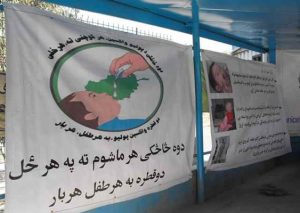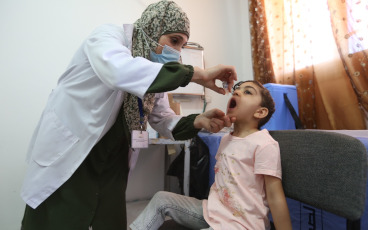To Protect Progress, WHO Declares Polio Spread Public Health Emergency of International Concern
To Protect Progress, WHO Declares Polio Spread Public Health Emergency of International Concern

On 5 May, after receiving advice from an Emergency Committee of independent experts and in order to protect progress toward eradication, WHO Director-General Margaret Chan declared the recent international spread of wild poliovirus a “public health emergency of international concern,” and issued Temporary Recommendations under the International Health Regulations (2005) to prevent further spread of the disease.
This decision comes at a time when the world is better-positioned than ever to end polio:
- The number of new polio cases has dropped more than 99% since the launch of the Global Polio Eradication Initiative (GPEI), to just over 400 in 2013 from 350,000 in 1988.
- The program is making progress against all objectives of the ‘endgame’ Strategic Plan to end polio by 2018:
Two of the three remaining endemic countries are making strides against the disease – Nigeria has reported just two cases so far this year, and three of Afghanistan’s four cases in 2014 are directly linked to transmission from Pakistan. - Efforts are on track to launch the most ambitious vaccine introduction in history and to strengthen routine immunization systems, both critical to ending polio.
- The program is making progress against all objectives of the ‘endgame’ Strategic Plan to end polio by 2018:
- India, considered the most technically-challenging place to eradicate polio, is polio-free and more of the world’s population lives in certified polio-free regions than ever before.
However, from January to April this year – considered the low-transmission season for polio – the virus has been exported to three countries in three major epidemiological zones: in central Asia (from Pakistan to Afghanistan), in the Middle East (Syria to Iraq) and in Central Africa (Cameroon to Equatorial Guinea). At the end of 2013, 60% of polio cases were the result of the international spread of the virus.
Although outbreaks have been an expected risk in global eradication, the Committee deemed consequences of further international spread to be particularly acute at this moment, with several countries with complex humanitarian emergencies or other major challenges bordering these infected countries.
As we enter the high transmission season for wild poliovirus, a coordinated international response is essential to raise immunity and stem the spread of the virus. The Director-General’s recommendations are a signal of the international community’s commitment to protecting global progress against polio and using all necessary measures to end the disease forever.
The Director-General’s emergency recommendations are as follows.
For countries currently exporting wild poliovirus (Pakistan, Cameroon, and Syria):
- the head of state or government should officially declare that the interruption of polio transmission is now a national public health emergency, if this has not been done already;
- they should ensure that all residents and long-term visitors (of over 4 weeks) receive an additional dose of oral polio vaccine (OPV) or inactivated poliovirus vaccine (IPV) between 4 weeks and 12 months before each international journey;
- they should ensure that residents and long-term visitors who are going on urgent travel (less than 4 weeks’ notice) and have not been vaccinated with OPV or IPV within the previous 4 weeks to 12 months, receive a dose at least by the time of departure as this will still provide benefit, particularly for frequent travellers;
- they should ensure travellers are provided with a WHO/IHR “yellow booklet” International Certificate of Vaccination or Prophylaxis or equivalent to record their polio vaccination and serve as proof of vaccination;
- they should maintain these measures until at least 6 months have passed without new exportations and with documentation that there is strong surveillance for the virus and that people are getting vaccinated in all infected and high risk areas. Without such documentation, these measures should be maintained until at least 12 months have passed without new exportations.
- For countries which currently have wild poliovirus but have not transmitted it to another country in the low-transmission season in 2014 (Afghanistan, Equatorial Guinea, Ethiopia, Iraq, Israel, Somalia and Nigeria):
- the head of state or government should officially declare that the interruption of polio transmission is now a national public health emergency, if this has not been done already;
- they should encourage residents and long-term visitors to receive an additional dose of OPV or IPV 4 weeks to 12 months prior to each international journey; those undertaking urgent travel (less than 4 weeks’ notice) who have not been vaccinated with a dose of OPV or IPV within the previous 4 weeks to 12 months should be encouraged to receive a dose by the time of departure;
- ensure travellers have access to an appropriate document to record their polio vaccination status;
- maintain these measures until at least 6 months have passed without the detection of wild poliovirus transmission in the country from any source.
- The WHO Director-General will convene the Emergency Committee again in three months to reassess the situation and the temporary recommendations.












